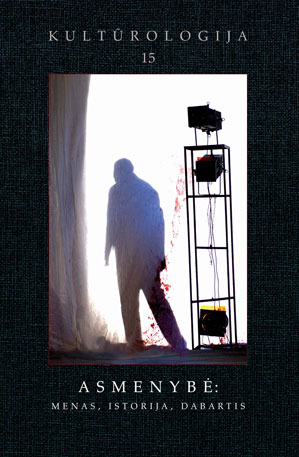Paradokso poetika Kosto Ostrausko dramose
Poetics of Paradox in the Dramas of Kostas Ostrauskas
Author(s): Aušra MartišiūtėSubject(s): Cultural history
Published by: Lietuvos kultūros tyrimų
Keywords: poetics; paradox; drama; Kostas Ostrauskas
Summary/Abstract: Kostas Ostrauskas has been writing plays for 50 years, and manages to remain an avant-garde and observant writer with an inexhaustible imagination. The mystery of the innovativeness and avant-garde character of Ostrauskas' work was encouragement to look deeper into the entirely of his work, and explain what is constant and unchanging, andwhat influences the individual style of Ostrauskas playwriting and creates the impression of freshness in his work. The focus of research of this article is the playwriting of Kostas Ostrauskas during the period 1951-2006. Paradox is considered to be one of the primary features of this playwright's asmenybė: work. The goal of this article is to define as precisely as possible the dabartis concept of the Ostrauskasian understanding of paradox, and find the development of the content of paradoxes and form, and its stages. A focus on ideas of the absurd and the search for the poetics of the theatre of the absurd dominated in his earlier work (in the 50s and 60s). Paradox is revealed in the theatre of the theatre of form ("Pypkė"), and music and verbal language experiments ("Kvartetas"). It was during this period that Ostrauskas' work harmoniously flows into the world context of the theatre of the absurd. The ideas of postmodernism came to the forefront in works during the 70s, 80s and 90s - it’ s during this time that Ostrauskas turns back to the classics of literature (Shakespeare's plays and works of Lithuanian literature). Deconstruction, contrasting characters (choosing a well-established stereotype and an unexpected view destroying it) and episodes, juxtapositions of opinions (with a fragmentary composition style of drama characteristic of this period), the clashes and conflicts between the work's author and his created characters, and problems of interpreting a character begin to dominate in the expression of the paradox. A separate stage of the search for the expression of the paradox consists of micro and mini-dramas, published in the magazines Metmenys, Kultûros barai, and Metai, and put together in a cycle called "Proverbs and Sayings", as well as the drama "Spec(tac)ulum mindi" which gives off the effect of a unified work in form. The minimalist form (the drama reminds one of a scene, a dialogue of characters, and an event changing the situation among other things) which is necessary insofar as it reveals the "movement" of the essence of paradox. Attention towards the theatre of the absurd is a constant feature in Ostrauskas' work, from time to time revealing new and unexpected ideas in expressive works such as the triptych "Once Upon A Time Lived a Grandfather and Grandmother" (2000), in conceptual dialogues with interpretations of Samuel Beckett's dramas (the diptych "Who", 1991, 2001), and Friedrich Nietzsche's philosophical idea of the Übermensch ("Summa philosophica or "Also sprach Zaratustra", 1995). Kostas Ostrauskas was a tireless seeker of paradoxes, combining consistency with an enjoyment o
Journal: Kultūrologija
- Issue Year: 2007
- Issue No: 15
- Page Range: 451-468
- Page Count: 17
- Language: Lithuanian

